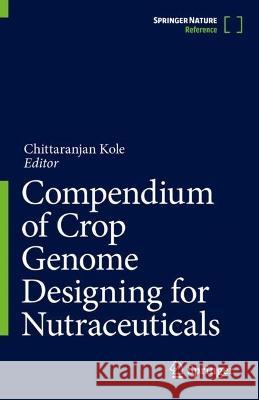Compendium of Crop Genome Designing for Nutraceuticals » książka
Compendium of Crop Genome Designing for Nutraceuticals
ISBN-13: 9789811941689 / Angielski
The crop plants cater not only to our basic F5 (food, feed, fiber, fuel, and furniture) needs but also provide a number of nutraceuticals with potential nutritional, safety and therapeutic effects. Many crop plants provide an array of minerals, vitamins, and antioxidant-rich bioactive phytochemicals. Increasing incidences of chronic diseases such as cancer, diabetes and HIV, and malnutrition necessitate global attention to health and nutrition security with equal emphasis to food security. This compendium complies research on biochemical, physiological and genetic mechanisms underlying biosynthesis of the health and nutrition related nutraceuticals. It also explores the precise breeding strategies for augmentation of their content and amelioration of their quality in crop plants under all commodity categories including cereals and millets, oilseeds, pulses, fruits and nuts, and vegetables. The compendium comprise 5 sections dedicated to these 5 commodity groups and presents enumeration on the concepts, strategies, tools and techniques of nutraceutomics. These sections include 60-plus chapters devoted to even number of major crop plants. These chapters’ present deliberations on the biochemistry and medicinal properties of the nutracuticals contained; genetic variation of their contents; classical genetics of and breeding for their quantitative and qualitative improvement; tissue culture and genetic engineering for augmentation of productivity and quality; and sources of genes underlying their biosynthesis. They also include comprehensive enumeration on genetic mapping of the genes and QTLs controlling the contents and profile of the nutraceuticals and molecular breeding for their further improvement through marker assisted selection and backcross breeding tools. Prospects of post-genomic precise targeted breeding strategies including genome-wide association mapping, genomic selection, allele mining and genome editing are also discussed. This compendium fill the gap in academia and research and development wings of the private sector industries and will also facilitate understanding of the policy making agencies and people in the socio-economic domain and benefit students, teachers, scientists, policy makers and sponsoring agencies involved in an array of subjects including genetics, genomics, tissue culture, genetic engineering, molecular breeding, genomics-assisted breeding, bioinformatics, biochemistry, physiology, pathology, entomology, pharmacognosy, IPR, etc.
The crop plants cater not only to our basic F5 (food, feed, fiber, fuel, and furniture) needs but also provide a number of nutraceuticals with potential nutritional, safety and therapeutic effects. Many crop plants provide an array of minerals, vitamins, and antioxidant-rich bioactive phytochemicals. Increasing incidences of chronic diseases such as cancer, diabetes and HIV, and malnutrition necessitate global attention to health and nutrition security with equal emphasis to food security. This compendium complies research on biochemical, physiological and genetic mechanisms underlying biosynthesis of the health and nutrition related nutraceuticals. It also explores the precise breeding strategies for augmentation of their content and amelioration of their quality in crop plants under all commodity categories including cereals and millets, oilseeds, pulses, fruits and nuts, and vegetables. The compendium comprise 5 sections dedicated to these 5 commodity groups and presents enumeration on the concepts, strategies, tools and techniques of nutraceutomics. These sections include 60-plus chapters devoted to even number of major crop plants. These chapters’ present deliberations on the biochemistry and medicinal properties of the nutracuticals contained; genetic variation of their contents; classical genetics of and breeding for their quantitative and qualitative improvement; tissue culture and genetic engineering for augmentation of productivity and quality; and sources of genes underlying their biosynthesis. They also include comprehensive enumeration on genetic mapping of the genes and QTLs controlling the contents and profile of the nutraceuticals and molecular breeding for their further improvement through marker assisted selection and backcross breeding tools. Prospects of post-genomic precise targeted breeding strategies including genome-wide association mapping, genomic selection, allele mining and genome editing are also discussed. This compendium fill the gap in academia and research and development wings of the private sector industries and will also facilitate understanding of the policy making agencies and people in the socio-economic domain and benefit students, teachers, scientists, policy makers and sponsoring agencies involved in an array of subjects including genetics, genomics, tissue culture, genetic engineering, molecular breeding, genomics-assisted breeding, bioinformatics, biochemistry, physiology, pathology, entomology, pharmacognosy, IPR, etc.











